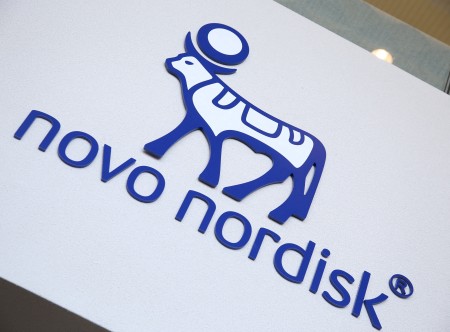By Maggie Fick and Jacob Gronholt-Pedersen
LONDON/COPENHAGEN (Reuters) -Novo Nordisk’s shares fell nearly 5% on Friday after results from a Phase 2a trial of the Danish drugmaker’s experimental obesity pill monlunabant came in below market expectations.
The company announced headline results from its trial of monlunabant, an experimental drug it acquired as part of its $1 billion purchase of Canadian biotech company Inversago Pharmaceuticals last year.
The company said at its capital markets day in March that it expected the drug could achieve weight loss of 15% of body weight, on par with its mega-blockbuster obesity injection Wegovy.
But in the headline trial results released on Friday, the once-daily pill resulted in only 6.5% weight loss after 16 weeks.
Novo Nordisk shares were down 4.8% at 1407 GMT, at their lowest level in more than five weeks.
That weight loss is “not what optimists are looking for”, Nordnet analysts said. “Competition is intensifying. Investors are getting more cautious about the potential.”
Despite the lower than expected weight loss, Novo Nordisk said that based on the results of the trial, it will initiate a larger phase 2b trial to further investigate dosage of the medication and the safety profile of the drug “over a longer duration in a global population”. It expects to begin that trial next year, according to its statement.
With Wegovy, Novo Nordisk was first-to-market with a highly-effective weight loss medication from a drug class known as GLP-1 receptor agonists. U.S. rival Eli Lilly is the only other company with an obesity drug from the same class.
Both companies have clocked record profits since launching these drugs, and recently some analysts raised annual global sales forecasts for the weight-loss drug market treatments to about $150 billion by the early 2030s.
But the race is on between the two companies, and a growing number of others, to develop more treatments with even better weight loss, to meet booming demand.
Monlunabant is a cannabinoid or CB1 receptor blocker, meaning that although it has a similar effect as the GLP-1 drugs already on the market, it has a different mechanism of action.
In the trial of 243 patients, the most common side effects were gastrointestinal, the company said. There was “reporting of mild to moderate neuropsychiatric side effects” such as anxiety, and sleep disturbances, for those taking monlunabant compared to placebo. “No serious adverse events were reported in relation to neuropsychiatric side effects”, the release read.
Speaking at the capital markets day, Novo Nordisk’s head of development Martin Holst Lange said there could be a “really, really big upside” if clinical trials ruled out neuropsychiatric disorders that have been side effects of past failed drug candidates from the CB1 receptor class.
Shares in small U.S. biotech company Corbus Pharmaceuticals, which is also developing a weight-loss drug from the CB1 class, plunged on Friday after Novo’s data release.
(Reporting by Maggie Fick in London and by Jacob Gronholt-Pedersen in Copenhagen;Additional reporting by Greta Rosen Fondahn in Gdansk;Editing by Louise Heavens and Susan Fenton)





